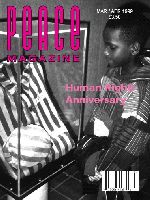
Peace Magazine Mar-Apr 1999, page 26. Some rights reserved.
Search for other articles by PMag staff here
Russia has stepped up its military assistance to Armenia, triggering protests from Azerbaijan. The war over the Nagorno Karabakh region, a district formerly controlled by Azerbaijan, ended in a cease-fire agreement in 1994, which left Armenian units in control of Nagorno Karabakh and large swaths of Azerbaijan.
Azerbaijan responded by pursuing an alliance with Western countries. Heydar Aliyev has used the West's interest in Azeri oil reserves to call for a "special relationship" with NATO.
However, the U.S. Department of Defense is legally prohibited from cooperating with Azerbaijan. Congress responded to the Azerbaijan-initiated blockade of Armenia by prohibiting assistance from the U.S. to Azerbaijan. Besides, U.S.-Azeri military cooperation might ruin Washington's quest for a rapprochement with Iran.
Talk of an arms race in the region may be premature. Azerbaijan cannot afford a large military buildup, although future oil income could provide the necessary money in the long run. While the U.S. has sponsored NATO expansion eastward in spite of Russia's opposition, it has refrained from active military involvement in the Caucasus, where Russia has a strong armed presence.
Lacking NATO support, Azerbaijan has turned to its neighbors. The defence ministers of Azerbaijan, Georgia, and Ukraine met to discuss a proposal for a joint battalion. Georgia and Azerbaijan are interested in building oil pipelines to export Azeri oil to Western Europe via Georgia.
Tomas Valasek, Center for Defense Information
The Clinton Administration has added $6.6 billion to missile defence over the next six years, bringing the total to $10.5 billion. Although the Senate twice defeated the National Missile Defense Act in 1998, in February the Senate Armed Services Committee endorsed the reintroduced legislation, which, if enacted, would push the U.S. closer to deployment of a missile defense system, even if it doesn't work. It would not protect the U.S. from the most likely means of nuclear terrorism - nuclear devices delivered by ships, airplanes, or trucks.
The proposal means the U.S .and Russians would have to amend the 1972 ABM treaty. By pushing the new system, the Administration threatens to sacrifice passage in the Russian Duma of Start II.
New York Times
According to the Center for Defense Information in Washington, the number of wars increased by two between January 1998 and January 1, 1999, when the new total stood at 23.
Africa and Europe registered renewed or new conflicts that pushed up this year's count. In Africa, battles between the Angolan government and Jonas Savimbi's Union for the Total Independence of Angola (UNITA) shredded what was left of the 1994 Lusaka peace accord. In the Democratic Republic of Congo, rebels opposed to the government of Laurent Kabila were supported by Rwanda and Uganda. Kabila had gained power with aid from the same countries, who now accuse him of allowing cross-border attacks by their opponents.
The fighting in Kosova, which only started in 1998, was sufficiently bloody to surge past the generally accepted figure of 1,000 casualties to be deemed a "major" conflict. This figure does not include refugee casualties.
The most deadly of the other major conflicts in CDI's survey include civil wars in Afghanistan, Sri Lanka, Algeria, Sierra Leone, Rwanda, Burundi, Somalia, and Sudan. Israel, Hamas and Hizbollah continue their struggle in southern Lebanon, and the struggle by the Kurds against Turkey, Iran, and Iraq seems destined to continue.
The U.S.-British assault on Iraq in December and the exchanges with Iraqi surface-to-air missile sites are not included in the list of major conflicts because casualties were low. However, the U.S.-Iraqi situation is on a separate list of 19 flashpoints.
Progress was made in resolving long standing conflicts, such as the 30-year Northern Ireland conflict. But the Accord was almost sabotaged by a fire bomb that killed three children and a bomb planted by an IRA splinter group that killed 23.
Basque separatists (ETA) in Spain agreed to end their fight. The Wye River Accord between Israel and Palestine provided some hope but further progress awaits the Israeli elections in the spring. Peru and Ecuador have resolved their border dispute, and while fighting still continues between insurgents and the government of Colombia, new peace talks are about to begin to try to resolve that nation's long-running conflicts.
by Colonel Daniel Smith <dsmith@cdi.org>. ee <http://www.cdi.org/issues/World_at_War/wwar.htm>.
Peace Magazine Mar-Apr 1999, page 26. Some rights reserved.
Search for other articles by PMag staff here